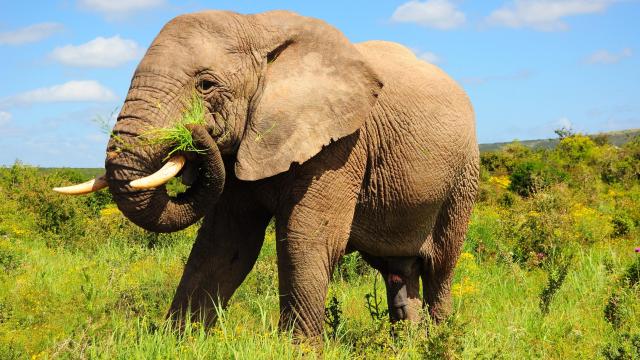Just like some people, elephants seem to prefer a rich palette of foods, research out this week suggests. Studying decades-old poop, researchers found that elephants tend to have diverse diets that can differ significantly from others in the same community. These diets are further influenced by the time of year and the elephants’ specific circumstances.
Past research has been able to show the broad strokes of an elephant’s plant-based diet. But conservation scientists at Brown University and elsewhere wanted to truly understand the food preferences of these gentle giants and how these preferences might be shaped by their environment and community. Elephants are social animals, living and foraging for food in large groups.
“When I talk to non-ecologists, they are stunned to learn that we have never really had a clear picture of what all of these charismatic large mammals actually eat in nature,” said study author Tyler Kartzinel, an assistant professor of environmental studies and of ecology, evolution, and organismal biology at Brown, in a statement from the university. “The reason is that these animals are difficult and dangerous to observe from up-close, they move long distances, they feed at night and in thick bush and a lot of the plants they feed on are quite small.”
To get a better look at the elephant diet, the team relied on a relatively new form of genetic analysis called DNA “metabarcoding.” This technique allowed researchers to identify the traces of many different living things within a single sample — in this case, poop collected about 20 years earlier from elephants in two separate communities in Kenya, Africa. The team cross-referenced what they found against a DNA database of plants in the area. They also combined their results with other forms of analysis, including GPS tracking, to help determine the variation in diet between individuals in these groups.
All told, they identified at least 367 genetically distinct types (or taxa) of plants that had been recently eaten by the elephants, and up to 137 unique plants within a single poop sample. On an individual level, their diets could vary widely, even among elephants that ate together that same day.
The findings, published Wednesday in the journal Royal Society Open Science, seem to help answer some important questions about elephants and their society, the authors say. While living in groups would provide many benefits for these animals, it could also potentially threaten their survival by forcing them to compete for the same foods. The researchers found some environmental factors that might limit their choices — diets were typically less diverse during the dry season, for instance. But in general, it appears that elephants have sidestepped this problem by adopting widely varied diets.
This research shouldn’t just help scientists understand elephants better, but also improve their odds of survival in the future, the authors say. Conservation efforts, for instance, might need to make sure that elephants have access to a diverse range of plants in the area. And by doing so, we might also reduce the risk of elephants inadvertently harming humans by going after their crops or other sources of food.
“Wildlife populations need access to diverse dietary resources to prosper,” Kartzinel said. “Each elephant needs variety, a little bit of spice — not literally in their food, but in their dietary habits.”
